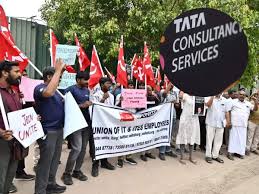TCS Layoffs Protests Erupt Amid Job Security Concerns

Introduction
The recent protests by employees against layoffs at Tata Consultancy Services (TCS) have raised significant concerns about job security in India’s booming IT sector. With TCS being one of the largest IT services firms globally, the protests reflect widespread anxiety among tech workers and industry stakeholders regarding the future of employment and the impact of corporate downsizing.
Context of the Protests
In October 2023, TCS announced a restructuring plan that would result in significant layoffs across various departments. This decision came amidst a challenging economic climate characterized by slowing demand for IT services and a push towards automation and digitalization. Employees expressed their outrage, claiming that many of the layoffs were abrupt and without sufficient justification.
Details of the Protests
The protests primarily took place in major cities like Mumbai, Bengaluru, and Chennai, where employees gathered outside the company offices to voice their concerns. Organizers stated that the demonstrations aimed to highlight the need for transparency and fair severance packages for those affected. Many employees held placards demanding job security and a reversal of the layoffs. Social media has also played a crucial role, with employees sharing their stories and experiences under hashtags like #TCSProtest.
Responses from TCS and the Government
In response to the growing unrest, TCS management has acknowledged the concerns of their employees but emphasized that the restructuring is necessary for the company’s long-term sustainability. They stated that the goal is to adapt to the evolving market needs while remaining competitive globally. Additionally, labor unions have stepped in to support the protesting employees, urging the government to step in and safeguard the rights of IT workers during such transitions.
Conclusion
The TCS layoffs protest highlights the tension between corporate restructuring and employee rights in a rapidly changing job market. As the situation unfolds, it may prompt broader discussions about employment policies in the tech industry and the need for stronger protections for workers facing sudden job losses. Analysts predict that if the issue remains unresolved, more significant unrest could arise in the IT sector, potentially affecting productivity and employee morale. The outcome of these protests may redefine labor relations in the tech industry and could steer regulatory initiatives aimed at protecting workers in the gig economy.







